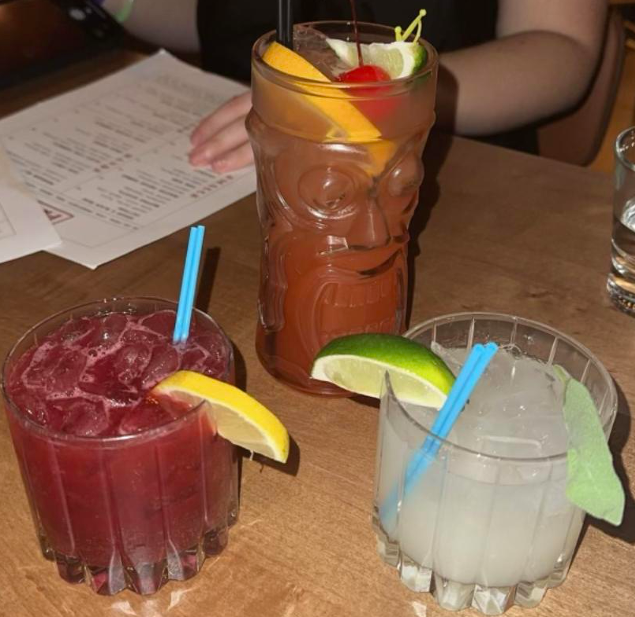
Generally speaking, I am not a big fan of lagers. My taste palate tends to lean more toward the bitter side of the brewing divide, and I find that most lagers fall too far on the bland side for my personal enjoyment. I certainly won’t say no to a lager every now and then, but typically it is not my first choice of brewing style by any means.
However, being the self-indulgent drinker that I am, sometimes I’m willing to forgo my usual regimen of IPAs and imperial stouts in favor of experimentation. Even if I end up repulsed by whatever strange brew I delve into, at the end of it all beer is still beer and there are little complaints to be made.
The subject of this week’s column, Port Brewing Company’s Hot Rocks Lager, is not a beer I personally chose to write about. Instead, it was gifted to me by one of my housemates as a means of repaying me for a recent beer run for the communal fridge. Rather than repay me with the token Rolling Rock that functions much like currency in our house, he decided to surprise me with a bomber of craft beer (or, what he later informed me, he merely guessed was craft beer since he is admittedly not as well versed as yours truly). Not being one to look a gift horse in the mouth (or more appropriately, a beer horse), I gladly accepted. Given that I was a little stuck for what to write about this week, the circumstances perfectly aligned.
Much to my delight, Hot Rocks Lager has more going for it than just a catchy name. Port Brewing is a subsidiary of the Lost Abbey Brewing Company, which specializes in Belgian-style brewing as well as barrel-aged beers. A few of their popular selections include the Agave Maria Ale aged in Anejo tequila barrels and the Red Barn Farmhouse Ale.
Port Brewing Company is co-located with Lost Abbey in San Marcos, Calif. in the former brewhouse of Stone Brewing Company. Co-founder and Director of Brewery Operations Tomme Arthur was once head brewer at the Pizza Port Brewpub, owned by siblings Gina and Vince Marsaglia, both of whom are also co-founders of Port Brewing. According to the Lost Abbey website, although Port Brewing grew from the enterprises of Pizza Port’s brewing endeavors, it is “a completely separate company with its own brewers, employees and direction.”
Port Brewing has carved a niche in the beach-themed beer market with their tropical-themed packaging and summer-y titles like Wipeout West Coast IPA and Shark Attack Double Red Ale. Even Hot Rocks Lager comes equipped with a caricature of a Hawaiian luau complete with dancing Tiki idols and the menacing shadow of a volcano in the background. Though “Hot Rocks” does sound marginally suggestive, the name derives from an antiquated brewing practice that is, actually, quite literal.
Hot Rocks is brewed in the tradition of German “steinbier,” translated literally as “stone beer.” The name is rooted in the practice of dropping heated stones into a brewing kettle to force a boil of the wort (the mixture of malt sugars to be fermented by brewing yeast to produce alcohol). The addition of hot rocks causes the sugar to caramelize and assume a smokier flavor that is difficult to achieve with a normal boiling process. Though Port Brewing surely has access to more modern brewing equipment than was available in ancient Germany, their adherence to tradition exemplifies a dedication to brewing that honors both the contemporary and the ancestral.
After some research, I was fully on board with Hot Rocks, despite its lager status. However, according to BeerAdvocate, Hot Rocks is billed as a European Dark Lager, a style that relies more heavily on the sweeter flavors of malt than the bitterness of hops. Though I am a sucker for some hefty bitterness, I was willing to reconcile my taste proclivities for the sake of inquiry.
Hot Rocks pours out a deep amber-brown with distinct cloudiness and traces of sediment that settle toward the bottom of the glass. The head, a creamy half-inch of sand-colored foam, settles slowly to thinner ropes of lacing as it releases the pungent aroma of caramel. Waves of toffee and smoky malt weave their way into the nostrils with hints of bready sweetness reminiscent of some lighter Belgian-style fare. Surprisingly enough, this beer has a distinctly hearty mouth-feel, fleshed out no doubt by the lack of carbonation that makes for a thicker drinking sensation. Beneath some initial wateriness come notes of dark fruits and spice mellowed out with a honey-like sweetness from the caramelized malt. There is almost no discernible hop presence in this beer, but the complexity of flavor in the malt more than makes up for it.
A certain tartness accompanies the dry finish of this beer, relegating an aftertaste of earthy fruit and lingering bread that causes visions of sweeter barleywines and fruit lambics to spring to mind. The impressiveness of this beer lies in the melding of sweet and subtle, accessing a multitude of flavors without sacrificing the simplicity of the beer’s style. As someone who goes ga-ga for bitterness, this beer was surprisingly enjoyable even given its low rank on the bitter spectrum. All in all, Hot Rocks is by no means my new favorite, but it is certainly the best lager I have sampled in recent memory.
Given the nature of its origin, I recommend Hot Rocks as an excellent accompaniment to pizza, as the sweetness in the malt lends itself well to the inherent sweetness of tomato sauce. This nifty little lager would surely pair well with items from the grill as well. Since the weather is (almost) perfect for barbecuing weather, the food pairing is contextually appropriate. And since this beer is relatively light in terms of alcohol (6.5 percent), there is no shame in enjoying some Hot Rocks of its own accord, preferably from the comfort of a lawn chair on a warm afternoon. Cliches aside, if you want to expand your crafty horizons but you shy away from the intensity of hops, Hot Rocks is a perfect excursion into craft brewing that is neither too contextually bizarre nor intimidating in terms of flavor. And if you suffer from an inherent sweet tooth, this is definitely the beer for you.
So for you lager-drinkers who’ve grown weary of the parade of similar-looking American lagers and pilsners swarming the shelves, reach for some Hot Rocks and start your spring drinking season with much-needed sweetness. Even if you don’t particularly care for the beer, in light of upcoming dates this month, it is certainly a good segue into “getting stoned” jokes.
Emily A. Brightman can be reached at [email protected].


















